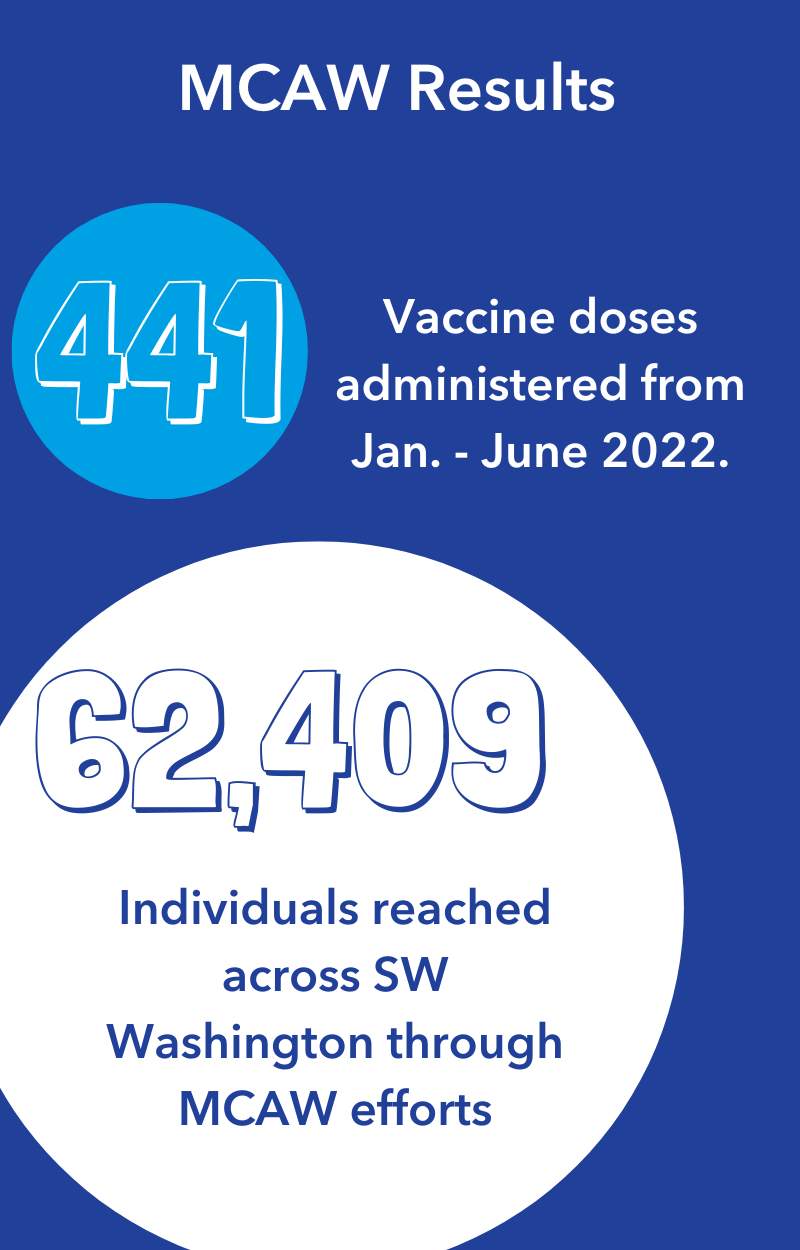A Year of COVID-19 Vaccine Outreach
When COVID-19 first reached our community, it was hard to imagine the impact the pandemic would have. For more than two years, we have been constantly learning how to keep our communities safe and the best way to support those in need.
During that time, we have seen how COVID-19 has affected medically underrepresented populations more than others. It is important for us to develop programs and plans that address this inequity while working to dismantle the wellness barriers most communities face. In July 2021, Southwest Washington Accountable Community of Health received a $1 million grant from the Health Resources and Services Administration (HRSA) to improve vaccine access and education in BIPOC, housing insecure, and other medically marginalized populations.
SWACH worked with community partners to develop the Mobilizing Culturally Appropriate Community-Based Workforce (MCAW) group. Working with Southwest Washington Equity Coalition (SWEC), we created a cohort of dedicated Community-Based Workers (CBWs) to provide culturally responsive COVID-19 outreach. We also worked closely with Sea Mar Community Health, Lutheran Community Services Northwest, Clark Cowlitz Fire and Rescue, Washington Gorge Action Programs (WAGAP), Youth and Family Link, and Share as a part of our outreach.
The cohort leverages a variety of outreach techniques including community events, tabling opportunities, neighborhood visits, and more. This community-based workforce has been incredibly effective in helping keep people safe and informed throughout Southwest Washington.
“One thing I’ve learned is that our BIPOC communities don’t know [of, or] receive many of the resources available to them, due to barriers”, said Briseida Castillo, a MCAW Community-Based Worker. “The best part of working in the MCAW project has been being able to inform communities of resources available to them and in their native languages.”
Addressing those barriers highlights the primary goal of the MCAW project. Providing culturally responsive outreach includes connecting with individuals in their native language, while also considering important cultural circumstances.
Representation in outreach efforts is crucial in addressing these barriers, which is something this cohort has done exceptionally well. The MCAW community-based workforce has reached out to community members in Spanish, English, Vietnamese, Chuukese, Russian, and Ukrainian.
Ruby Sparks, a MCAW CBW, went above and beyond to help individuals in multiple communities, especially native Vietnamese speakers, learn more about the vaccine. Her approach was to meet them where they were, literally. Sparks made it a point to attend cultural celebrations and events to connect with community members, which went a long way in providing culturally responsive information.
“By doing so, I have a real-time experience with the communities and get the cultural awareness from others to understand and sympathize with their situation,” said Sparks.
That approach demonstrates something powerful about the SWEC cohort. They can build genuine trust in their communities which helps individuals make informed decisions about the COVID-19 vaccine. That trust is essential when addressing vaccine hesitancy and misinformation in these communities.
“A lot of people are very confused about the vaccine, COVID, etc.,” said Bridgette Fahnbulleh, a MCAW CBW. “A bigger effort needs to be made to combat social media misinformation about these issues. [The most challenging part is] trying to convince people the vaccine is safe and dispelling internet theories about COVID.”
In many instances, the MCAW CBWs became trusted messengers for people – individuals from their same community who understood their language, culture and customs, and could address their concerns in a personal manner.
We are deeply appreciative to each member of the SWEC cohort for their dedication and commitment to this project. Their ability to provide accurate information and support in an empathetic manner is unparalleled.
“The best part of working the MCAW project would be the creative ability it gave me to introduce my own thoughts to the group and work collectively as a team,” says Shay Scott, a MCAW CBW. “I noticed that I have some areas I need to work on, but also saw my strengths.”
“[The best part has been] working with such dedicated people who generally want to help people,” added Briggette Fahnbulleh.
The HRSA grant was originally scheduled to conclude in July 2022, however SWACH was granted a no-cost extension through January 2023. This will allow us to continue vaccine education and access efforts for several months. SWEC has supervised the cohort thus far for the grant. Going forward, Youth and Family Link will be supervising the group. We are grateful to both of these organizations for their leadership. Many CBWs and partner agencies will continue with the project until it concludes, but not all. We appreciate everyone’s dedication and support in this work.
-
A note regarding our HRSA grant: This project is supported by the Health Resources and Services Administration (HRSA) of the U.S. Department of Health and Human Services (HHS) as part of an award totaling $1 million with 0 percentage financed with non-governmental sources. The contents are those of the author(s) and do not necessarily represent the official views of, nor an endorsement, by HRSA, HHS, or the U.S. Government.
The MCAW work was further sponsored by Amerigroup Washington and Molina Healthcare. Their investments in this project demonstrate a commitment to our community. We are deeply grateful for their support.

